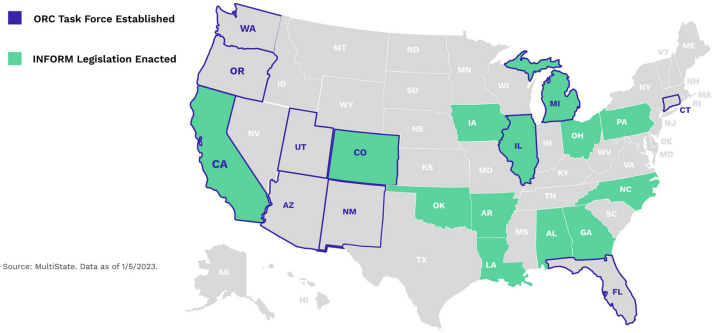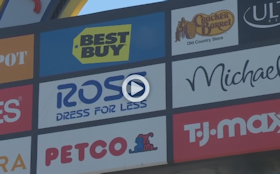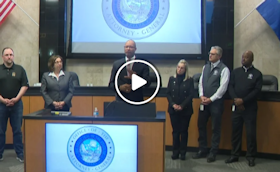The D&D Daily's Nationwide ORC Legislative
Update
Lawmakers at the federal and state level, in both political parties,
roll out bills to fight America's ORC crisis

With organized retail crime surging across the country, lawmakers
throughout the nation are crafting pieces of legislation to fight the crisis.
From state legislatures to the U.S. Congress, fighting ORC is finally becoming a
top priority. Read below for a federal and state-by-state rundown of the bills
being proposed or enacted to curb organized theft.
United States Senate:
S.140 - Combating Organized Retail Crime Act of 2023
A bill to combat organized crime involving the illegal acquisition of retail
goods for the purpose of selling those illegally obtained goods through physical
and online retail marketplaces.
01/30/2023: Read twice and referred to the
Committee on the Judiciary.
Sponsor:
Sen. Grassley, Chuck [R-IA]
Cosponsor:
Sen. Cortez Masto, Catherine [D-NV]*
Text of S. 140:
https://www.congress.gov/bill/118th-congress/senate-bill/140/text?s=1&r=14
S.139 - Organized Retail Crime Center Authorization Act of 2023
A bill to combat organized crime involving the illegal acquisition of retail
goods for the purpose of selling those illegally obtained goods through physical
and online retail marketplaces.
01/30/2023: Introduced in Senate
Sponsor:
Sen. Grassley, Chuck [R-IA]
Cosponsor:
Sen. Cortez Masto, Catherine [D-NV]*
Text of S. 139:
https://www.congress.gov/bill/118th-congress/senate-bill/139/text
01/31/2023:
Cortez Masto, Grassley, sponsor bill looking to reduce organized retail crime
01/31/2023: NRF Supports Recently Enacted Organized
Retail Crime Legislation Bills
ICSC Supports The Combating Organized Retail Crime Act of 2023
ICSC (International Council of Shopping Centers) strongly supports S. 140/H.R.
895, the bipartisan "Combating Organized Retail Crime Act of 2023,"
introduced in the 118th Congress by Senators Chuck Grassley (R-IA) and Catherine
Cortez Masto (D-NV) and Representatives Ken Buck (R-CO-04), Dina Titus
(D-NV-01), Susie Lee (D-NV-03) and David Joyce (R-OH-14).
The measure establishes a coordinated multi-agency response and creates new
tools to tackle evolving trends in organized retail theft.
Organized Retail Crime: State Legislative Measures
Thirteen states - Arkansas, Alabama, California, Colorado, Georgia, Illinois,
Iowa, Louisiana, Michigan, North Carolina, Ohio, Oklahoma and Pennsylvania -
have enacted similar versions of the federal "INFORM Consumers Act" over the
last two years. And while INFORM promises to be an effective tool for preventing
stolen products from being fenced online, much attention will now be paid to how
policies dealing with ORC will be enforced in the new year.
Strengthening law enforcement's ability to target organized retail criminal
operations continues to be high priority. Eleven states - Arizona,
California, Colorado, Connecticut, Florida, Illinois, Michigan, New Mexico,
Oregon, Utah and Washington - have established an ORC task force within the
Attorneys General offices to investigate and prosecute suspects involved in
organized retail crimes. These task forces provide increased funding to support
coordination among law enforcement, prosecutors, and businesses to focus on
stopping multi-jurisdictional retail crime operations.
Statewide ORC task forces have been responsible for a string of major
organized retail criminal busts. The Attorneys General of California,
Illinois and New Mexico have each carried out coordinated sting operations based
on the important work that their state ORC task forces have conducted. The
signing of the INFORM Consumers Act marked a major policy breakthrough for
retailers and local communities. Moving into 2023 and onward, however,
retailers and other stakeholders need to continue building relationships with
local officials, law enforcement agencies, attorneys general and others to
ensure that curbing organized retail crime remains priority number one.

Statewide Legislative
Efforts - 18 States Addressing ORC
3/8/23: Oregon Senate puts forward two bills aimed
at combatting ORC
 Senate
bills 318 and 340 were put forth this legislative session; one aims at providing
more funding increased enforcement and better communication between Oregon's
Department of Justice, local police departments, and retailers. The other
changes Oregon's current criminal code, and if passed, would make it easier to
prosecute criminal organizations involved in organized retail theft.
Senate
bills 318 and 340 were put forth this legislative session; one aims at providing
more funding increased enforcement and better communication between Oregon's
Department of Justice, local police departments, and retailers. The other
changes Oregon's current criminal code, and if passed, would make it easier to
prosecute criminal organizations involved in organized retail theft.
On Tuesday, the Washington County DA's Office announced its support for the two
bills, with DA Kevin Barton stating, "I am keenly aware of the challenges our
community faces from increased organized retail crime. These crimes impact all
members of our community, including both large and small businesses and
employees and customers alike. As the nature and scope of these crimes evolve,
it is important that our laws also evolve to keep pace."
kptv.com
Senate Bill 318:
Read the Text
Senate Bill 340:
Read the Text
Public hearing for Senate bills 318 and 340 held in the Senate Judiciary
Committee at 1 p.m. on Wednesday, March 8.
Oregon Business & Industry Supports New ORC
Legislation
In a statement provided to the D&D Daily by Policy
Director & Counsel Derek Sangston, Oregon Business & Industry (OBI) expressed
support for two new pieces of legislation, and outlined their ongoing efforts to
battle ORC:
 We
are the Oregon affiliate for the National Retail Federation and work with
our retail members regularly on matters that affect their ability to do business
here. Organized retail crime is certainly one of these. The phenomenon affects
retailers across the state, both in cities and in rural areas.
We
are the Oregon affiliate for the National Retail Federation and work with
our retail members regularly on matters that affect their ability to do business
here. Organized retail crime is certainly one of these. The phenomenon affects
retailers across the state, both in cities and in rural areas.
OBI helped establish the Oregon Retail Crime Task Force, which began to
meet monthly in September 2022. The task force brought together retailers, law
enforcement officials, prosecutors and others to identify common challenges,
share information and, ultimately, make recommendations to the Legislature.
Two sets of recommendations, supported by OBI, are contained in Senate Bills
318 and 340.
Senate Bill 318 would address the problem by funding an analyst and a
pair of criminal investigators within the Oregon Department of Justice to
help investigate and prosecute organized retail theft. They would coordinate
with local law enforcement, prosecutors and private loss-prevention specialists.
The bill also would give $5 million to the Criminal Justice Commission to
administer a local grant program to boost retail theft enforcement.
Senate Bill 340 would add organized retail theft to the state's
repeat offender statute, making it easier for prosecutors to aggregate the
value of stolen property. The bill also would allow prosecutions for organized
retail theft in any county in which a single crime was committed. Finally, it
would provide for enhanced penalties for people who place employees and others
at risk when engaging in reckless conduct.
OBI policy team member Derek Sangston testified in support of these bills before
the Senate Judiciary Committee March 8. You can read his testimony
here. OBI will continue to support this effort to curtail organized retail
crime.
1/30/23: New Mexico HB 234 Creates new crime of
"Organized Retail Crime"
Creates a new crime of "organized retail crime" for those who engage in a
concerted effort with others to: steal or help steal merchandise worth $2,500 or
more over the course of a year; receive, purchase or possess merchandise worth
$2,500 or more over the course of a year knowing or believing it is stolen; or
recruits, coordinates, organizes, supervises, directs, manages, or finances
another to commit organized retail crime or shoplifting (regardless of the
amount of merchandise stolen). Those convicted or organized retail crime are
guilty of a second-degree felony.
Redefines the definition of "racketeering" to include "organized retail crime,"
which allows convictions for organized retail crime to serve as a predicate
offense for a racketeering charge (in addition to the organized retail crime
conviction).
governor.state.nm.us
March 2023: Bill to stiffen shoplifting crimes
passes New Mexico House
California:
AB-335 - Proposition 47 Repeal Bill
The Safe Neighborhoods and Schools Act, enacted as an initiative statute by
Proposition 47, as approved by the electors at the November 4, 2014, statewide
general election, made various changes relating to theft and the possession of
controlled substances, including by, among other things, generally reducing the
penalty for those crimes, including reducing the penalty for possession of
concentrated cannabis, establishing a procedure by which individuals convicted
of those crimes prior to the passage of the act may petition for resentencing
under the act, and creating the crime of shoplifting.
Read the Text
03/08/23: From committee: Amend, and do pass
as amended and re-refer to Com. on APPR. (Ayes 8. Noes 0.) (March 7).
02/09/23: Referred to Com. on PUB. S.
01/31/23: From printer. May be heard
in committee March 2.
01/30/23: Read first time. To print.
Minnesota: SF 893
/ HF 450 - Crime of
Organized Retail Theft establishment
Sponsors: Senator Warren Limmer (R) Senator Ron Latz
(D)
A bill for an act relating to public safety; establishing the crime of organized
retail theft; providing for the release of certain financial account information
to law enforcement; amending certain burglary crimes following trespass notice;
establishing a time period for a search warrant on financial institutions;
amending Minnesota Statutes 2022, sections 13A.02, subdivisions 1, 2; 609.52,
subdivision 3; 609.527, subdivision 1, by adding a subdivision; 609.582,
subdivisions 3, 4; 626.15; proposing coding for new law in Minnesota Statutes,
chapter 609. EFFECTIVE DATE. This section is effective August 1, 2023.
Read the Text
01/27/2023: Introduction and first reading
01/27/2023: Referred to Judiciary and Public
Safety
Pennsylvania: HB 192 Referred to Committee on
Judiciary - March 8, 2023
Striking Third Strike Amending Title 18 (Crimes and Offenses) of the
Pennsylvania Consolidated Statutes, in theft and related offenses, further
providing for the offense of retail theft. Felony of the third degree when the
offense is a third or subsequent offense, regardless of the value of the
merchandise. (v) Felony of the third degree when the amount involved exceeds
$1,000 or if the merchandise involved is a firearm or a motor vehicle.
Sponsor:
Representative D. MILLER
In the near future, I will be re-introducing legislation that would eliminate
the three-strike felony provision for retail theft. Currently, a person can get
felony of the third degree for a third retail theft conviction no matter the
value of the item taken. This means that you can get a felony for stealing a
tube of toothpaste.
To put this in context, a felony of the third degree can carry up to 7 years in
prison with $15,000 in fines. Other charges that can be a felony of the third
degree include involuntary manslaughter, carrying a firearm without a license,
robbery, and institutional sex assault.
Retail theft is overwhelmingly committed by people who are battling addiction.
This otherwise low-level, non-violent offense is more often than not committed
by a woman with a drug problem. It is our belief that the goals of public
safety, accountability, and restitution can be served under existing retail
theft misdemeanor grading. However, the impact of felony charge can severely
impede our shared goals of long-term sobriety, reintegration, and independence.
Simply put, a third degree felony for a tube of toothpaste while in the midst of
drug addiction is an unwarranted and unhelpful barrier to a productive life.
This legislation leaves in place the felony of the third degree grading for
retail theft of items over $1,000, firearms, and cars.
Read the Text
Washington:
HB 1656 Changing the definition of Theft; adoption of Amendment 584 Organized
Retail Theft |
Learn more here
Feb 2022:
Committee Voted NO Without Recommendation 6 (R) to 7 (D). The Bill did not make
it out of committee
Nevada: Attorney General Introduces Bill for Office
to Investigate, Prosecute Organized Retail Theft
 Assembly
Bill 50 The bill, according to AG Ford, would allow the office of the Attorney
General to investigate and prosecute organized retail theft crimes. AG Ford says
organized retail theft crimes are criminal actions in which thieves target
retailers to steal a large amount of products, and then resell the items in
different venues either in-person or online. The bill would also allow the
office to investigate counterfeit goods and fraudulent transactions.
2news.com
Assembly
Bill 50 The bill, according to AG Ford, would allow the office of the Attorney
General to investigate and prosecute organized retail theft crimes. AG Ford says
organized retail theft crimes are criminal actions in which thieves target
retailers to steal a large amount of products, and then resell the items in
different venues either in-person or online. The bill would also allow the
office to investigate counterfeit goods and fraudulent transactions.
2news.com
Virginia: March 2023:
Bill before Gov. Youngkin would punish Organized Retail Theft
Before adjourning the legislative session last month, lawmakers in the Virginia
General Assembly sent a bill to Gov. Glenn Youngkin that would crack down on
groups who commit organized retail theft. Two identical bills in the House and
Senate would make it a Class 3 felony, punishable by 5 to 20 years in prison,
for any individual who "conspires" or acts with another person to shoplift from
one or more retail establishments "with the intent to sell such retail property
for monetary or other gain." The felony charges would be triggered when $5,000
or more worth of goods is stolen within a 90-day period, according to the bills'
text.
The governor has a March 27 deadline to act on both measures, according to
the state's bill tracking system. Macaulay Porter, the governor's
spokeswoman, said the governor is reviewing the legislation but did not directly
answer whether Youngkin plans to sign the bills. Representatives from the
governor's administration spoke in support of the House version of the bill as
it advanced in committee.
thecentersquare.com
Virginia: Feb 2023:
Virginia passes law to crack down on Organized Retail Theft
 Lawmakers
approved legislation that will make organized retail theft a felony and make
those convicted of the crime eligible for prison sentences of up to 20 years.
The legislation, which has the governor's support, will make it a Class 3 felony
for anyone to conspire or act in concert with one or more people to steal retail
merchandise with a value exceeding $5,000 in a 90-day period, with the intent to
sell the stolen goods for profit.
13newsnow.com
Lawmakers
approved legislation that will make organized retail theft a felony and make
those convicted of the crime eligible for prison sentences of up to 20 years.
The legislation, which has the governor's support, will make it a Class 3 felony
for anyone to conspire or act in concert with one or more people to steal retail
merchandise with a value exceeding $5,000 in a 90-day period, with the intent to
sell the stolen goods for profit.
13newsnow.com
Oklahoma: Dec 2022:
Congress must help Oklahoma combat organized retail crime
In 2015, the Organized Retail Crime Act (House Bill 1966) was introduced to
address the state's organized retail crime wave. The bill would have made
organized retail crime a felony, but the legislation ultimately died in
committee.
tulsaworld.com
Kansas: State Senate approves SB 244 to fight
Organized Retail Crime
Senators also approved
Senate Bill 244, which would provide authority to the Kansas Attorney
General to prosecute any crime committed in multiple counties. Attorney General
Kris Kobach said he would use that authority to crack down on retail theft, one
of major campaign promises. The legislation passed on a 35-3 vote.
wibw.com
twitter.com
Colorado: 2022:
HB22-1099: Online Marketplaces And Third-party Sellers
Concerning mandatory disclosures of third-party sellers selling through
online marketplaces.
House Bill
22-1099 was passed with nearly unanimous bipartisan support in the General
Assembly, and signed into law by Gov. Jared Polis in March 2022. Starting Jan.
1, 2023, the law requires companies that operate online marketplace platforms to
identify online sellers, verify their information and provide seller disclosures
to consumers. They must also include an easily identifiable reporting mechanism
giving consumers a tool to flag and report suspicious activity.
Colorado Attorney General Phil Weiser announced the formation of a new statewide
task force targeting organized retail theft and the reselling of stolen goods
online. Law enforcement officials from across the state will convene to develop
a shared set of resources for cross-jurisdictional investigations aimed at
preventing the sale of stolen goods through online marketplaces. The task
force's formation comes as a new state law goes into effect that aims to reduce
the anonymous online sale of stolen goods, according to a news release from the
attorney general's office.
coloradonewsline.com
Michigan: Senate Bill 691, effective date
Oct 2022
Senate Bill 691, which was approved unanimously by the Senate last month, would
add similar language to the state's racketeering penal code in order to provide
more legal leverage against criminals at the top of these efforts. Michigan's
Organized Retail Crime Act, which was passed in 2012, prescribed felony
sentencing for organizing, supervising, financing or assisting another person in
committing organized retail crimes.
legislature.mi.gov
North Carolina: July 2022:
New NC law cracks down on organized retail crimes
Gov. Roy Cooper signed Senate Bill 766 into law. The new law focuses on
organized retail theft. Organized retail theft is two or more people working
together to steal from businesses with the intent to resell. The law also
regulates high-volume third-party sellers online.
cbs17.com
Florida: SB 1534 Approved
6/17/2022
The bill amends s. 812.015, F.S., the retail theft statute, to create new third
degree felony and second degree felony retail theft crimes based on multiple
retail thefts occurring in a limited time period in different merchant
locations. Specifically, the bill amends the statute to provide that a person
commits retail theft, a third degree felony, if the person individually, or in
concert with one or more other persons, commits five or more retail thefts
within a 30-day period and in committing such thefts obtains or uses 10 or more
items of merchandise, and the number of items stolen during each theft is
aggregated within the 30-day period to determine the total number of items
stolen, regardless of the value of such merchandise, and two or more of the
thefts occur at different physical merchant locations.
The bill also amends the statute to provide that a person commits a second
degree felony if the person individually, or in concert with one or more other
persons, commits five or more retail thefts within a 30-day period and in
committing such thefts obtains or uses 20 or more items of merchandise, and the
number of items stolen during each theft is aggregated within the 30-day period
to determine the total number of items stolen, regardless of the value of such
merchandise, and two or more of the thefts occur at a different physical retail
merchant location.
The bill also amends s. 921.0022, F.S., the offense severity level ranking chart
of the Criminal Punishment Code, to rank the new third degree felony retail
theft offense as a level 5 offense and rank the new second degree felony retail
theft offense as a level 6 offense.
The
newest bill signed by Gov. Ron DeSantis is taking aim at the rise of retail
theft in the state. The measure is designated to crack down on what State
Attorney Ashley Moody has called "organized retail crime."
Under SB 1534, harsher penalties will be invoked on individuals who are caught
stealing. The new bill will now make it a second or third-degree felony to get
caught stealing, depending on the quantity of stolen goods.
flsenate.gov
Georgia: May 2022:
Gov. Kemp Signs Inform Consumers Act to Prevent ORC
Governor Brian P. Kemp signed SB 332, also known as the Inform Consumers Act,
which prevents criminals from selling goods stolen from retail stores on any
online marketplace platform.
allongeorgia.com
GA's
SB33: A BILL to be entitled an Act to amend Chapter 1 of Title 10 of the
Official Code of Georgia Annotated, relating to selling and other trade
practices, so as to provide for certain disclosures by third-party high-volume
sellers of consumer products on online marketplaces; to provide for definitions;
to require online marketplaces to provide certain notifications and a consumer
reporting mechanism; to provide for civil remedies; to provide for a short
title; to provide for related matters; to provide for an effective date; to
repeal conflicting laws; and for other purposes.
Read the text
Illinois: May 2022:
Gov. Pritzker signs bill aimed at addressing ORC
 Gov.
JB Pritzker signed legislation Friday that is aimed at cracking down on
high-profile "smash-and-grabs" and other organized retail theft. "This important
piece of legislation will help to combat these unlawful activities by addressing
the problem from multiple angles," Chauncey Rice, government relations manager
for the Illinois Retail Merchants Association, said at a news conference. It
defines, for the first time, organized retail crime into law and creates stiffer
penalties for the ringleaders of retail thefts. The law goes into effect Jan. 1,
2023.
capitolnewsillinois.com
Gov.
JB Pritzker signed legislation Friday that is aimed at cracking down on
high-profile "smash-and-grabs" and other organized retail theft. "This important
piece of legislation will help to combat these unlawful activities by addressing
the problem from multiple angles," Chauncey Rice, government relations manager
for the Illinois Retail Merchants Association, said at a news conference. It
defines, for the first time, organized retail crime into law and creates stiffer
penalties for the ringleaders of retail thefts. The law goes into effect Jan. 1,
2023.
capitolnewsillinois.com
HB 1091 (enacted May 2022)
Ohio: May 2022: Bill
to Combat Organized Retail Crime Signed into Law
 Ohio
House Bill 272 championed by State Rep. Haraz Ghanbari (R-Perrysburg) was signed
into law by the governor Wednesday. The legislation designed to combat organized
retail crime, jointly sponsored by State Rep. Phil Plummer (R-Dayton), requires
high-volume, third-party online sellers to disclose certain pieces of
identifying information in order to protect consumers. Ghanbari attended the
bill signing ceremony. The bill defines a high-volume third-party seller as a
participant in an online marketplace that, in any continuous 12-month period in
the previous 24 months has entered into at least 200 discreet sales for new or
unused consumer goods resulting in at least $5,000 of gross revenue. The
required identifying information for sellers on product listings would include
details such as name, email address, or business tax I.D. number and would
further require the online marketplace to verify such information within ten
days of the seller qualifying as high volume.
ohiohouse.gov
Ohio
House Bill 272 championed by State Rep. Haraz Ghanbari (R-Perrysburg) was signed
into law by the governor Wednesday. The legislation designed to combat organized
retail crime, jointly sponsored by State Rep. Phil Plummer (R-Dayton), requires
high-volume, third-party online sellers to disclose certain pieces of
identifying information in order to protect consumers. Ghanbari attended the
bill signing ceremony. The bill defines a high-volume third-party seller as a
participant in an online marketplace that, in any continuous 12-month period in
the previous 24 months has entered into at least 200 discreet sales for new or
unused consumer goods resulting in at least $5,000 of gross revenue. The
required identifying information for sellers on product listings would include
details such as name, email address, or business tax I.D. number and would
further require the online marketplace to verify such information within ten
days of the seller qualifying as high volume.
ohiohouse.gov
Wisconsin: May 2022:
Assembly Bill 829
An Act to amend 973.12 (1) and 973.12 (2); and to create 939.6197 of the
statutes; Relating to: mandatory minimum sentence for three or more convictions
for retail theft and providing a penalty. Report vetoed by the Governor on
4-18-2022
GOVERNOR'S VETO MESSAGE April 8, 2022: To the Honorable Members of the
Assembly: I am vetoing Assembly Bill 829 in its entirety. This bill would create
a 180-day mandatory minimum sentence for a person convicted of a third offense
of retail theft, which includes theft of services, within five years. I am
vetoing this bill in its entirety because I object to restricting the discretion
of judges to address the circumstances of the violation before them. Republican
and Democrat-controlled states alike have been leading efforts to reform the
justice system by using data-driven, evidence-based practices to inform
decisions that help keep our communities safe. I welcome the opportunity to have
meaningful conversations about holding offenders accountable while implementing
strategies that can keep our kids, our families, and our communities safe. I
remain hopeful the Legislature will join me in this important work.
Respectfully submitted, TONY EVERS Governor
- Placed on calendar 5-17-2022 pursuant to Joint Rule 82 (2)(a)
- Failed to pass notwithstanding the objections of the Governor pursuant
to Joint Rule 82





